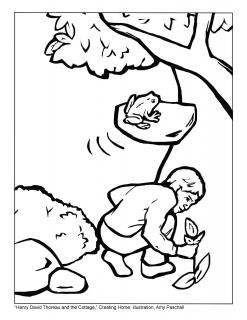Henry David Thoreau and the Cottage
Part of Creating Home

COLORING SHEET
"Henry David Thoreau and the Cottage" (PDF)
Illustration: Amy Paschall
Written by Tracey L. Hurd.
This is a story is about a boy who loved the outdoors. His name was Henry David Thoreau. All his life, he loved nature. It was almost as if he had a small, still voice inside him that whispered, “Go outside. Be amidst the trees, and lakes, and grass. This is your true home.” Henry listened to that voice all of his life. This is his story.
Henry lived in Concord, Massachusetts more than 100 years ago. The town had some buildings, but all around there were forests and ponds, rivers and fields. Henry loved being outdoors; he loved to explore. He liked the feeling of being close to the earth, of being surrounded by plants, bugs, birds, and wildlife. Outside, Henry was never bored. He was busy watching, finding, and enjoying nature. Outside, Henry felt at home.
Henry kept notes about nature and liked to share ideas about what he saw. Later, when he was grown up, he wrote that nature was like a nursery (a special room for the care of children) for him. Henry went to school, and church, and he helped with the chores of his family but most of all he loved being outdoors. When he went to bed at night, he placed his bed so that he could look out at the stars. For Henry, seeing nature and knowing that he was part of the world around him made him feel most comfortable.
Henry grew up and went to school and later to college. He read a lot of books. He was especially interested in books written by Transcendentalists, who believed that appreciating the beauty of nature is a way of feeling close to the Spirit of Life or God. Henry listened to that small voice inside him, telling him to spend time outside—exploring in the icy snow or in the summer heat. He became friends with Transcendentalists who agreed that even grown-ups can learn a lot by spending time in nature. Henry hoped that one day he could live very simply in nature. He knew he would feel at home.
One Transcendentalist friend named Ralph Waldo Emerson told Henry, “You should keep a journal about all the things you notice in nature.” He also invited Henry to try out his idea of living close to nature. Henry called it his great experiment. He decided to make a very simple home on a large area of land that surrounded Walden Pond. The land was owned by his friend Emerson, who allowed him to live there in exchange for Henry’s help doing some repairs around Emerson’s house.
Henry decided to build his home as small, simple, and plain as it could be. He wanted to spend most of his time outside; he wanted to feel close to the land. Henry wanted to have time to notice and write about the changes in nature—the birds, the plants, and the leaves on the trees. Henry made a list of all the things he would need to live on Walden Pond. He tried to include as few things as possible. The list included some tools for farming, a bed, a writing desk, a table and three chairs. With the help of his friends, Henry built a small cabin, just one room, ten feet wide and fifteen feet long. He used old wood, bricks from other houses, windows that nobody else needed, to build his small cabin. When it was completed, Henry moved in.
Although his friends and family understood what Henry was doing, townspeople found Henry’s experiment in living in nature confusing. They wondered why he would want to live that way. But Henry listened to that small, still voice. He felt at home in nature. He planted food for himself to eat, using a small amount of land. He took great care to notice all around him. He watched the changes in the Walden Pond over the seasons. He found everything from grasshoppers to wildflowers to be beautiful and interesting. Henry wrote in his journal, “I look down into the quiet parlor (living room) of the fishes, pervaded by a softened light. Ah, the pickerel (fish) of Walden! When I see them lying on the ice, I am always surprised by their rare beauty, as if they were fabulous fishes. They possess a quite dazzling… beauty.”
Henry lived on Walden Pond for more than two years. He came to town to see people, to work for Emerson, to get some supplies, but mostly Henry remained at his home in the woods. Sometimes people would visit him there. Many children liked his small cabin and they understood that feeling of being at home in nature.
And then, one day, Henry decided that he was finished. He had learned so much from living in nature that he felt ready to try something else. He felt ready to make his home with people again. But he never forgot his time on Walden Pond. He wrote books about it. And he taught other people that caring about nature is important.
Some people say that Henry David Thoreau was one of the most important naturalists (writers about nature) that ever lived. Henry was able to listen to that voice inside him that told him that he was at home in nature. He was able to live his dream; he felt at peace. As he finished his book about his time at Walden Pond he wrote: “I learned this, at least, by my experiment; that if one advances confidently [goes] in the direction of his dreams, and endeavors [tries] to live the life which he has imagined, he will meet with a success unexpected.”